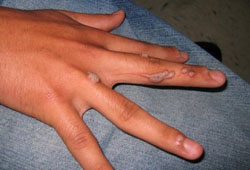Resumo
Definição
História e exame físico
Principais fatores diagnósticos
- presença de fatores de risco
- crescimento da lesão ao longo de semanas a meses
- pápula arredondada, saliente
- pequenos pontos pretos na superfície da lesão
Outros fatores diagnósticos
- lesões satélites
- lesões nos dedos ou nas dobras ungueais
- lesões faciais
- fissuras
- hiperceratose
- coloração branca-acinzentada ou marrom claro
- pápula filiforme com espículas pontiagudas
Fatores de risco
- imersão em água
- profissões que envolvem o manuseio de carne ou peixe
- roer unhas
- idade abaixo de 35 anos
- imunocomprometido
Investigações diagnósticas
Primeiras investigações a serem solicitadas
- nenhum exame inicial
Investigações a serem consideradas
- biópsia de pele
- coloração com imunoperoxidase
- cultura da pele
Algoritmo de tratamento
verruga comum: imunocompetente
verruga comum: imunocomprometido
verruga filiforme
Colaboradores
Autores
Angela Yen Moore, MD
Director
Arlington Center of Dermatology
Primary Investigator
Arlington Research Center
Arlington
Clinical Assistant Professor
Baylor University Medical Center
Dallas
Clinical Assistant Professor
University of Texas Medical Branch
Galveston
TX
Declarações
Dr. Moore receives funds as an advisory board member (A), consultant (C), clinical study investigator (I), and speaker (SP) – for Abbvie (I,SP), Almirall (C,I,SP), Arcutis (I), Biofrontera (C,I), Boehringer Ingelheim (I), Bristol-Myers Squibb (C,I), Dermavant (I), DS Biopharma (I), Eli Lilly (I), EpiHealth (A), Evolus (A), Galderma (I), Incyte (I), Janssen (I), Leo (A,SP), Mayne Pharma (C,I), Nimbus (I), Novartis (I), Parexel (I), Pfizer (I,SP), UCB (I), Verrica (I), Vyne (I,SP).
Agradecimentos
Dr Angela Yen Moore would like to gratefully acknowledge Dr Leonid Izikson, the previous contributor to this topic. LI declares that he has no competing interests.
Revisores
Brenda L. Pellicane, MD
Dermatologist
Wayne State University School of Medicine
Department of Dermatology
Detroit
MI
Declarações
BLP declares that she has no competing interests.
David Cassarino, MD, PhD
Assistant Professor
Department of Pathology and Laboratory Medicine
University of California
Los Angeles
CA
Declarações
DC declares that he has no competing interests.
Jashin J. Wu, MD
Chief Dermatology Resident
University of California
Irvine
CA
Declarações
JJW declares that he has no competing interests.
Sam Gibbs, FRCP
Consultant Dermatologist
Dermatology Department
The Great Western Hospital
Swindon
UK
Declarações
SG declares that he has no competing interests.
Créditos aos pareceristas
Os tópicos do BMJ Best Practice são constantemente atualizados, seguindo os desenvolvimentos das evidências e das diretrizes. Os pareceristas aqui listados revisaram o conteúdo pelo menos uma vez durante a história do tópico.
Declarações
As afiliações e declarações dos pareceristas referem--se ao momento da revisão.
Referências
Principais artigos
Lipke MM. An armamentarium of wart treatments. Clin Med Res. 2006;4:273-293.Texto completo Resumo
Gibbs S, Harvey I, Sterling J, et al. Local treatments for cutaneous warts: systematic review. BMJ. 2002;325:461.Texto completo Resumo
Kwok CS, Gibbs S, Bennett C, et al. Topical treatments for cutaneous warts. Cochrane Database Syst Rev. 2012;(9):CD001781.Texto completo Resumo
Dall'oglio F, D'Amico V, Nasca MR, et al. Treatment of cutaneous warts: an evidence-based review. Am J Clin Dermatol. 2012;13:73-96. Resumo
Artigos de referência
Uma lista completa das fontes referenciadas neste tópico está disponível para os usuários com acesso total ao BMJ Best Practice.

Diagnósticos diferenciais
- Verrugas planas
- Verrugas palmoplantares
- Ceratose seborreica
Mais Diagnósticos diferenciaisDiretrizes
- Guidelines for the prevention and treatment of opportunistic infections in children with and exposed to HIV
- Guidelines for the prevention and treatment of opportunistic infections in adults and adolescents with HIV
Mais DiretrizesFolhetos informativos para os pacientes
Verrugas (comuns)
Vacina contra o HPV (papilomavírus humano)
Mais Folhetos informativos para os pacientesConectar-se ou assinar para acessar todo o BMJ Best Practice
O uso deste conteúdo está sujeito ao nosso aviso legal